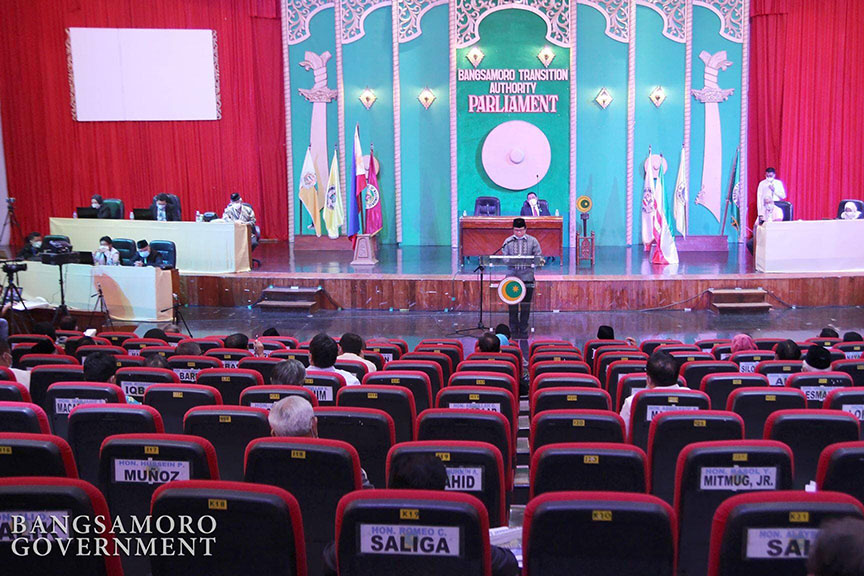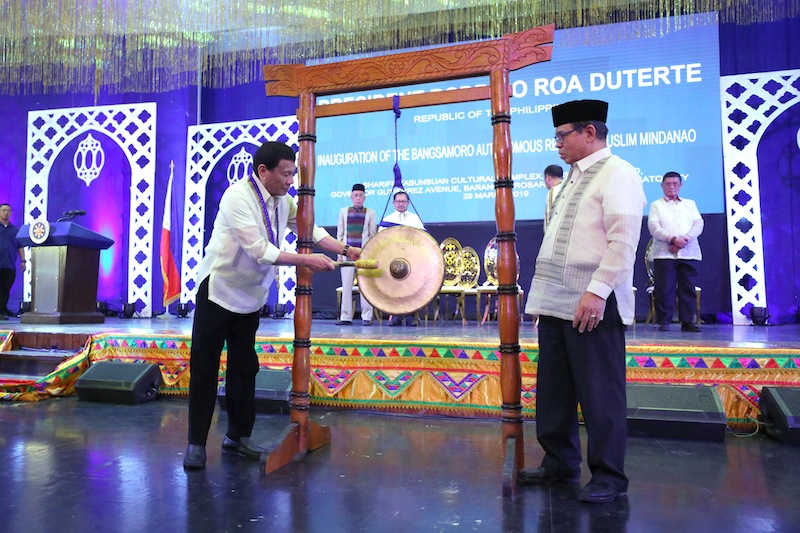DAVAO CITY (MindaNews / 04 July) – Two-days after passing a resolution appealing to President Rodrigo Duterte to veto the Anti-Terrorism Bill and a day after the President signed it into law, the leadership of the Bangsamoro Autonomous Region in Muslim Mindanao (BARMM) did a quick turnaround, saying it “fully respects” his decision and now wants to be represented in the Anti-Terrorism Council (ATC).
In a five-paragraph statement released Saturday afternoon, Chief Minister Ahod “Al Haj Murad” Ebrahim said there is no one way of addressing threats of terrorism and the BARMM is “open to engage the national government” on
preparedness against it “as we collectively explore new potential approaches to holistically protect our people from the menace of terrorism.”
Ebrahim said the engagement “can start with the Bangsamoro having representation in the Anti-Terrorism Council.”
 The Parliament in session under the “new normal” at the Shariff Kabunsuan Cultural Complex. Photo courtesy of the Bangsamoro Government
The Parliament in session under the “new normal” at the Shariff Kabunsuan Cultural Complex. Photo courtesy of the Bangsamoro Government
It is not clear what kind of “representation” the Bangsamoro region wants.
If it is membership in the council itself, the law specifies under Section 45 that it is composed of nine members with the Executive Secretary as chair, National Security Adviser as Vice Chair, the Secretaries of Defense, Finance, Foreign Affairs, Information and Communications Technology, Interior and Local Government and Justice, and the Executive Director of the Anti-Money Laundering Council Secretariat, as members.
The law, however, lists BARMM as among 15 government entities including the National Commission on Muslim Filipinos, that “shall serve as support agencies of the ATC.”
The ATC is among the three major issues about the bill that Ebrahim cited in his position statement sent to the Bangsamoro Transition Authority (BTA) Parliament on June 22, that “raises alarm and concern for the Bangsamoro people” and is also cited in the resolution that the Parliament passed.
“The power of the Anti-Terrorism Council to order an arrest and to designate persons, groups, organizations, or associations as terrorists which violate the separation of powers and again, the right to due process,” Ebrahim said in his statement distributed to Members of Parliament on June 23.
Ebrahim’s position statement was not released to the public and not published in the Bangsamoro website or Facebook page. It was taken up in the Parliament only on July 2, during a special session, where they finally deliberated on the proposed Resolution 239.
In calling on the President to veto the bill, Ebrahim said that while a policy framework “needs to be enacted to fight the menace of terrorism, we feel that the fundamental guarantees of liberty and the institutions of democracy must be protected. We can do better.”
From expressing “grave concern” about the passage of the anti-terror bill, the resolution was amended to read “respectfully appealing” to President Duterte to veto the bill “to provide Congress the opportunity to review and address the issues of vagueness, overbreadth and other concerns.”
 President Rodrigo Roa Duterte sounds the agong to signal the inauguration of the Bangsamoro Autonomous Region in Muslim Mindanao (BARMM) at the Shariff Kabunsuan Cultural Complex in Cotabato City on March 29, 2019, marking the ‘new dawn for the Moro.’ Joining the President is BARMM interim Chief Minister Ahod Balawag Ibrahim (MILF chair Al Haj Murad Ebrahim). ROBINSON NIÑAL JR./PRESIDENTIAL PHOTO
President Rodrigo Roa Duterte sounds the agong to signal the inauguration of the Bangsamoro Autonomous Region in Muslim Mindanao (BARMM) at the Shariff Kabunsuan Cultural Complex in Cotabato City on March 29, 2019, marking the ‘new dawn for the Moro.’ Joining the President is BARMM interim Chief Minister Ahod Balawag Ibrahim (MILF chair Al Haj Murad Ebrahim). ROBINSON NIÑAL JR./PRESIDENTIAL PHOTO
The resolution states that they support the national government’s initiative to strengthen the law to prevent, prohibit, counter and penalize terrorism but noted that an effective counter-terrorism law “must be evidence-based and intended to respond to the actual evil sought to be prevented or penalized with provisions that do not encroach on fundamental freedoms enshrined in the Constitution.”
It expressed grave concern over the following provisions: “sanctioning warrantless arrests outside of the limitations allowed by the Rules of court and allowing wire-tapping of private conversations/communications upon ex parte application before the Court of Appeal and without an opportunity for the ‘suspect’ to prevent counter-veiling evidence at any stage of the proceedings; detention of suspects for 14 to 24 days without a valid commitment order from the courts, and unilateral designation of persons or groups ‘as terrorist’ by the Anti-Terrorism Council, consisting of members appointed by the executive, and lack of remedies to question such designation before the courts.”
“Such provisions, once enacted, could be counterproductive as it could instill fear or compound resentment among our peoples,” it said.
The Parliament also approved that the resolution as amended be authored by all. The resolution was approved with no objection at 6:02 p..m.on July 2.
But even before copies of resolution could be sent to the President, Duterte signed RA 11479 or the Anti-Terrorism Act of 2020 on July 3, before leaving for Zamboanga City to talk to troops to calm them down after the killing of four Army intelligence operatives by police in Jolo, Sulu on June 30.
The two other concerns Ebrahim raised in his statement sent to the Parliament are the “overly vague definition of terrorism and penalizing various acts related thereto that not only violate the due process clause of the Constitution but also make easy targets of innocent individuals and make them vulnerable to human rights violations” and the “surveillance of suspects and interception and recording of communications, and detention without a judicial warrant of arrest for prolonged periods of detention that violate fundamental rights, including the right to privacy and the rights of the accused.”
Ebrahim’s July 4 statement said the leadership of the Bangsamoro Government acknowledges the need for a strong policy direction in the fight against terrorism and “we trust that the President will ensure that the concerns and apprehension of the Bangsamoro people on some provisions of the law will not happen.”
“Rest assured that we will support the implementation of the law and commit to continue the conversation within the Bangsamoro, in our effort to provide the National Government realistic context form the ground,” Ebrahim said. (Carolyn O. Arguillas / MindaNews )
READ:
BANGSAMORO SPEAKS: It is our fear that among the hardest hit once the Anti-Terrorism Bill passes into law would be the Bangsamoro
